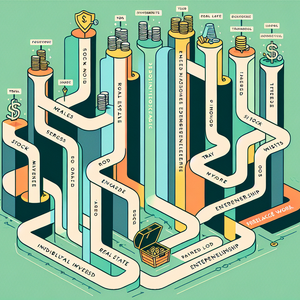The Gig Economy: Shaping the Future of Work in Washington

Washington State has witnessed a significant rise in gig work, particularly in urban centers like Seattle and Tacoma. Recent studies indicate that approximately 36% of the U.S. workforce engages in some form of gig work, a trend echoed in Washington. Platforms such as Uber, Lyft, TaskRabbit, and Upwork have enabled thousands of residents to redefine their careers and income streams. The allure of flexibility is a primary factor driving this trend. For example, a graphic designer based in Seattle may balance freelance projects during the day with ride-sharing in the evenings. This adaptability allows workers to align their professional commitments with personal responsibilities such as childcare or education. The ability to set one's own schedule is empowering, offering a level of control over work that traditional jobs may not provide.
Implications for Job Stability and Security
Despite the advantages of flexibility, the gig economy poses significant challenges regarding job stability and security. Unlike traditional employment, gig work often lacks consistent income and employee benefits, such as health insurance and retirement plans. A report from the Washington State Employment Security Department reveals that gig workers experience greater income volatility than their salaried counterparts, making financial planning a daunting task. For instance, ride-share drivers can see their earnings fluctuate dramatically based on demand, geographic location, and time of day. A driver working in a bustling Seattle neighborhood during peak hours may earn significantly more than one operating in a quieter area. This unpredictability can complicate budgeting and saving efforts, leaving gig workers vulnerable to financial instability.
Benefits and Drawbacks of Gig Work
The gig economy is characterized by a unique set of benefits and drawbacks. On one hand, gig work fosters entrepreneurial opportunities and skill diversification. For example, a talented photographer might supplement their income by offering editing services or conducting photography workshops. This diversification not only enhances earning potential but also contributes to a more robust professional portfolio. Conversely, the lack of traditional employment benefits can leave gig workers exposed. Many find themselves without access to health insurance, paid leave, or retirement savings. This vulnerability has prompted some gig workers to advocate for policy changes aimed at addressing these gaps. In Washington, initiatives are currently being explored to develop portable benefits systems that could provide a safety net for freelancers and gig workers.
Work-Life Balance in a Gig-Driven Market
Work-life balance is a critical consideration in the gig economy. The ability to set one's own hours can promote a fulfilling personal life; however, it can also blur the boundaries between work and leisure. Many gig workers report feeling pressured to work longer hours to maintain financial stability, often leading to burnout. A survey conducted by the Freelancers Union found that 63% of freelancers in Washington felt they could not take time off without jeopardizing their income. This statistic underscores the necessity for gig workers to establish boundaries and prioritize self-care while navigating the flexibility that freelancing offers.
Voices from the Gig Economy
To gain a well-rounded perspective on the gig economy in Washington, it's essential to consider the experiences of those participating in it. Local freelancers and gig workers share diverse narratives that highlight both the empowering aspects of their work and the challenges they encounter. For instance, Sarah, a freelance writer from Seattle, shares her appreciation for the freedom gig work provides, allowing her to pursue her passion while maintaining a flexible schedule for her family. However, she also notes the constant hustle required to secure new clients and the anxiety stemming from inconsistent income. Similarly, Mike, a ride-share driver, enjoys the autonomy of being his own boss but expresses concern about the lack of support during emergencies. Such personal accounts illustrate the complexities and dualities of gig work in Washington, revealing both its rewards and challenges.
The gig economy is reshaping the future of work in Washington State, offering flexibility and diverse opportunities that appeal to many seeking alternative career paths. However, the challenges it presents—such as job security, benefits, and maintaining a healthy work-life balance—cannot be overlooked. As gig work continues to grow and evolve, it is imperative for policymakers, businesses, and workers to collaborate in creating a more sustainable and supportive environment for all participants. While the future of work in Washington may be increasingly gig-driven, ensuring that this new landscape is equitable and rewarding for everyone involved remains a crucial endeavor. As the state moves forward, embracing the gig economy will require innovative solutions and proactive measures to address the unique needs of gig workers, fostering a more inclusive workforce that can thrive in a rapidly changing labor market.
Freelance Graphic Designer
Freelance platforms like Upwork, local design agencies, and startups
Core Responsibilities
Create visual concepts for clients, including logos, advertisements, and marketing materials.
Collaborate with clients to understand their branding needs and provide design solutions.
Manage multiple projects simultaneously while meeting deadlines and client expectations.
Required Skills
Proficiency in design software such as Adobe Creative Suite (Photoshop, Illustrator, InDesign).
Strong portfolio showcasing a variety of design styles and projects.
Excellent communication skills for client consultation and feedback.
Ride-Share Driver
Uber, Lyft, and other ride-share platforms
Core Responsibilities
Provide safe and reliable transportation to passengers, adhering to traffic laws and company policies.
Maintain cleanliness and functionality of the vehicle while ensuring a positive passenger experience.
Utilize GPS and navigation tools to optimize routes based on real-time traffic conditions.
Required Skills
Valid driver’s license and clean driving record.
Strong customer service skills and ability to manage passenger interactions.
Familiarity with local areas, especially urban settings like Seattle.
Remote Customer Support Specialist
Tech companies, e-commerce platforms, and customer service outsourcing firms
Core Responsibilities
Assist customers via phone, email, or chat to resolve inquiries and issues related to products or services.
Document customer interactions and feedback for continuous improvement of services.
Collaborate with other teams to escalate and resolve complex issues efficiently.
Required Skills
Strong problem-solving abilities and patience in handling customer concerns.
Familiarity with CRM software and multi-channel support systems.
Excellent verbal and written communication skills.
Independent Content Writer
Marketing agencies, online publications, and freelance platforms like Fiverr
Core Responsibilities
Research and produce high-quality written content across various topics for clients’ blogs, websites, and marketing materials.
Optimize content for SEO to improve visibility and engagement.
Edit and revise content based on client feedback to meet project goals.
Required Skills
Strong writing and editing skills, with a keen eye for detail.
Ability to work independently and manage time effectively to meet deadlines.
Understanding of SEO principles and content marketing strategies.
Virtual Assistant
Small businesses, startups, and freelancers looking for administrative support
Core Responsibilities
Provide administrative support to businesses and entrepreneurs, including scheduling appointments, managing emails, and organizing documents.
Assist with social media management and content creation to enhance online presence.
Conduct research and compile reports as needed to support business operations.
Required Skills
Strong organizational skills and attention to detail.
Proficiency in office software (e.g., Microsoft Office, Google Workspace) and project management tools.
Excellent communication skills and ability to work independently.


